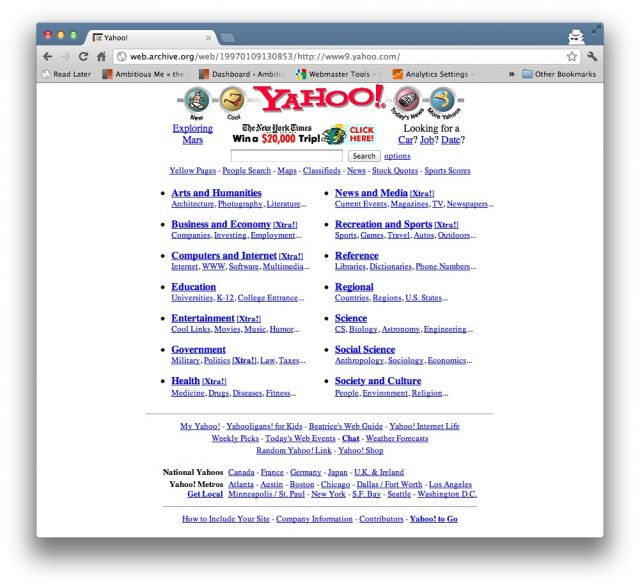So What, Who Cares (vol 2, issue 39) What a web browser's search engine tells us about people
Hello! I'm going to warn you in advance: This issue is tech-centric. If you can't get excited about the search settings in your browser, hit the archives for reruns -- like how Silicon Valley's parental leave policies reflect the changing nature of the tech workforce (vol 2, issue 31), or why long work weeks are a waste of everyone's time (vol 2, issue 24), or how Barack Obama foretold the return of the Dad and Mom Jean (vol 1, issue 51).
And tell me what you're up to! Did you observe St. Patrick's Day in any significant way? Tell me how via email or Twitter.
*
One of my favorite slow-building tech stories of the last six months has been watching the battle of the search engines in a Web browser.

Back in November 2014, the Mozilla Corporation brokered a deal: Yahoo would become the default search choice in Firefox's mobile and desktop Web browsers. I'm defining "default" here as the search engine which answers any search inquries you type into the little search field typically in the upper-right corner of a browser.
In exchange the Mozilla Corporation would get ... something that was not reported in any of the stories covering the deal. Mozilla's previous default option in its browsers had been Google, and that arrangement had cost Google $300 million annually. (It also provided up to 90% of the Mozilla Corporation's revenue.)
In December 2014, Mozilla released a new version of its browser, Firefox 34, and the default search engine in the tool bar was Yahoo. Users who had upgraded browsers could -- and did -- change the default to other options like Google, but it's not like Mozilla embedded a notice reading "Alert! We've reset your search engine preference to Yahoo!"

In January 2015, StatCounter released Firefox 34's first month of search stats. While Google queries made up 60% of all search queries from the browser toolbar, that was a big drop from 86% it had enjoyed in Firefox 33. Yahoo's numbers climbed from 7.5% of all searches in Firefox 33 to 32% in Firefox 34.
When Firefox users typed google.com into their browser address field and hit the search site, Google began asking if users wanted to change their default search engine to Google.
By February 2015, Yahoo's overall share of the search engine market had climbed by 2% while Google's share dropped below 75% for the first time since 2008. Why? As the story reports:
Firefox users are entirely responsible for the changes in Yahoo's and Google's U.S. search share, said StatCounter, a Dublin company that measures activity across a range of services like search, social media, and OSes.
A similar analysis unfolded at Comscore.
As of this week, Google has gone from a gentle inquiry to apparently changing the formatting of search results for Firefox users who do not have Google as the default in their browser. Before users see any results, it's asking if you wouldn't want to change your default setting right now.
(Note: I tested this in my own browser -- I'm currently using Firefox 37 -- and couldn't get the same results.)
So what? This does not mean that Yahoo's on the comeback trail. Indeed, the switch-over may have already peaked, because gains in January and February have been tiny compared to the 26-point surge in December. Also, now that Google's getting proactive about getting users back, we're about to see how Yahoo and Mozilla will respond.

The details of the Yahoo/Mozilla partnership are still largely unreported (we'll have to wait for Mozilla's 2014 or 2015 annual reports), so we don't know how much money is at stake or if it's tied to certain performance benchmarks as far as audience penetration.
But what we can see is that default settings matter in your software because a significant percentage of users will not change them. And it means that those settings can be very lucrative for the right partner.
Who cares? People who study the behavior of software users, because this is an excellent use case for how much people know or care about specific features in a software suite.
Also keenly interested in watching this unfold: people who want to make their particular tool or feature to be the default in a popular or ubiquitous software package.
And finally, people who love to set up or watch tech rivalries should see how this will play out. Yahoo is basically a front end for Bing, Microsoft's search engine, so this is a Google/Microsoft bout being played out via proxies.
Two other things to quietly mull for now: Think about how much information your browser broadcasts about you and your preferences to every website you visit -- as evidenced by how easily Google can target its "change your settings" appeal -- and think about how easily a search engine can change the way results are displayed, based on a software setting. Our experiences on the Web are circumscribed by whether or not companies find our data profiles to be to their liking.
*

Your pop culture note of the day: This Metafilter post on "The Mid Century Menu, as seen in cookbooks and brochures," brought up a lot of comments about gelatin dishes -- and why wouldn't it, with "barbecue bean jello mold" as one of the recipes test-driven by bloggers? -- and that sent me on a half hour nostalgia trip for J-E-L-L-O and its like.
Come along with me! We can start with the jello shot, upgraded for sophisticated adult palates, then continue our tour of booze that wobbles before you do with a recipe for claret jelly. Then enjoy Julia Reed's recipe for daube glauce -- a sort of congealed beef thing -- via the erudite and entertaining "Miss Congeality."
Side note: Julia Reed excels in writing a class of book I persist of thinking of as "bedtime reading" -- the writing is absorbing, but not so absorbing that your brain is racing all night. Also, three of her four books in print are culinary/lifestyle essay collections, and an essay is a perfect bedtime reading unit.

"Miss Congeality" is collected as a chapter in Ham Biscuits, Hostess Gowns, and Other Southern Specialties: An Entertaining Life (with Recipes), a book worth getting solely so you can have a print copy of her superior crab mornay recipe.
Her other food-writing compendiums are Queen of the Turtle Derby and Other Southern Phenomena and But Mama Always Put Vodka in Her Sangria!: Adventures in Eating, Drinking, and Making Merry.
Finally, The House on First Street is about her adventures in renovating an historic house and garden in New Orleans immediately before and after Hurricane Katrina. As is evident in every chapter, Reed is quite privileged and well-connected -- something Blake Bailey immediately addresses in his review of the book -- but the book is alive with a fierce devotion to the city and a demand to do better by the people who live in it. It's also a perfect gift to give to anyone enduring any sort of remodel.
*
Your pop bracketology note of the day: Am I mad, or have we not seen Consumerist's Worst Company in America bracket for 2015 yet? Here's last year's tournament where -- surprising nobody -- Comcast took it all the way.
*
Are there typos? I apologize in advance. The only editing class I did not get an A in was copyediting.
Did you miss an issue of So What, Who Cares? The archive is here.
Would you like a run-down of all the books and other pop culture picks ever mentioned in this newsletter? Then check out the Pinterest board. (Note: None of the links are affiliate links; I do not make money off anything I link to.)
If you really like So What, Who Cares?, tell a friend to subscribe.

